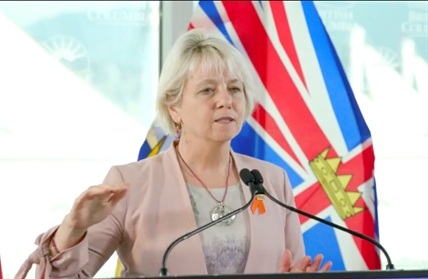Elevate your local knowledge
Sign up for the iNFOnews newsletter today!
Sign up for the iNFOnews newsletter today!
Selecting your primary region ensures you get the stories that matter to you first.

Enhanced restrictions on mask wearing and gatherings imposed on the Central Okanagan on Aug. 6 have now been expanded throughout the entire Interior Health region.
Those take effect as of midnight tonight, Aug. 20, Provincial Health Officer Dr. Bonnie Henry announced during a news conference today.
READ MORE: COVID-19 outbreak declared in Central Okanagan, masking ordered for all indoor spaces
The high rate of transmission centred on the Central Okanagan earlier but COVID is now spreading throughout the region, partly due to the fact that wildfires are forcing many people to relocate, Dr. Henry said.
“The good news is we have seen a levelling off of transmission in the Central Okanagan where these measures have been put in place,” she said, noting that's still at too high a level.
She also encouraged people not to travel for non-essential reasons in and out of the region that stretches from the U.S. and Alberta borders to the Cariboo.
The restrictions mean masks have to be worn in all indoor spaces and only one household or a maximum of five people can meet in homes.
Indoor and outdoor gatherings are limited to 50 people, high intensity fitness classes are banned and low intensity fitness classes are limited to 10 people.
READ MORE: Bars and nightclubs hardest hit by new COVID restrictions in the Central Okanagan
While bars and nightclubs were ordered closed in the Central Okanagan, Dr. Henry did not mention if that will apply throughout the region.
The Interior Health region lags behind the 83 per cent of B.C. residents who have been vaccinated. It’s at 76.8 per cent in the Interior Health region, Health Minister Adrian Dix said.
While the rate of new cases detected in the Central Okanagan have levelled off, the numbers are spiking in areas like Nelson, where the vaccination rate is only 72 per cent, and Creston where the vaccination rate is 65.4 per cent.
With people being evacuated because of wildfires, the virus has spread to friends, family and group accommodations where they’ve moved to.
“We realize we really need to take a regional approach that accounts for the fact that people are being displaced and moving within and across the region,” Dr. Henry said.
To contact a reporter for this story, email Rob Munro or call 250-808-0143 or email the editor. You can also submitphotos, videos or news tips to the newsroom and be entered to win a monthly prize draw.
We welcome your comments and opinions on our stories but play nice. We won't censor or delete comments unless they contain off-topic statements or links, unnecessary vulgarity, false facts, spam or obviously fake profiles. If you have any concerns about what you see in comments, email the editor in the link above.
News from © iNFOnews.ca, . All rights reserved.
This material may not be published, broadcast, rewritten or redistributed.

This site is protected by reCAPTCHA and the Google Privacy Policy and Terms of Service apply.
Want to share your thoughts, add context, or connect with others in your community?
You must be logged in to post a comment.